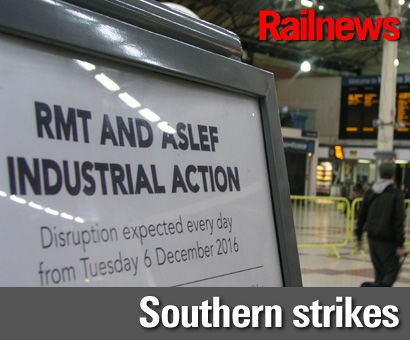TWO more days of strikes are underway on Southern, with no prospects in sight of an early resolution to the DOO dispute.
After talks failed again last week, both sides remain deadlocked in the debate over whether driver-only operation is safe, with the unions arguing that it presents unacceptable risks on today's busy railway, while the Department for Transport and Govia Thameslink Railway insist that it is not only safe but also offers the opportunity of increasing efficiency and performance on Southern, which is the only one of GTR's four divisions to have retained conductors until now.
Conductors are striking again today (19 December) and tomorrow, but the effect of their action is now being increased by a parallel and continuing ban on rest day working and overtime by ASLEF drivers. The drivers staged their own strikes last week -- closing the network altogether for three days.
There are no services on some Southern routes today and only a limited timetable applying on others, with last trains running much earlier than usual.
The disputes have been deepened by government allegations that the unions are politically motivated. It is also being claimed that the two sides are now engaged in a 'make or break' fight which could have long-term consequences for railway industrial relations, particularly if calls for legal restrictions on strikes prove successful.
The government has attempted to soften the blow to passengers by introducing 'Delay Repay 15' on GTR routes earlier this month, making GTR the first operator to offer partial refunds once a train is 15 minutes late, while Southern season ticket holders are also receiving additional compensation.
The continuing disputes are damaging railway finances, while some observers fear they could be threatening the wider economy as well. Go-Ahead Group, which owns two-thirds of Govia, warned on 15 December that revenue from GTR is expected to be down by four per cent over six months, while passenger numbers are contradicting wider industry trends by falling back 2 per cent. The losses will affect taxpayers rather than Govia, because revenue is collected by the DfT, but Go-Ahead had warned previously that the projected profits for the rest of the GTR franchise are likely to be halved to around 1.5 per cent, because of rising costs.
Analyst Joshua Raymond of xtb.com said: "At a time where real earnings are expected to slow dramatically as inflation kicks in, companies can ill afford any disruption. For workers in the city, productivity and deals tend to slow down a week before Christmas so the impact here is perhaps not as bad as at other times of the year. However, the transport disruption into London could do huge damage to footfall and sales, especially as firms will have stocked up on goods."
There could be more discussions soon. After talks with ASLEF broke down before the weekend, GTR chief operations officer Nick Brown said: "We're sincerely sorry that commuters' work and family lives are being punished with this unjustified and unprecedented industrial action. The unions must stop the pain and suffering blighting passengers and commerce. We will continue with our plans to modernise our railway and the services we offer customers. We urge the union to think again and work with us and move forward together. Our door remains open."
The RMT, meanwhile, is remaining firm on the issue of DOO, having also criticised new Merseytravel plans to buy a new fleet of trains which will not carry conductors.
General secretary Mick Cash said today: "Our guards on Southern are taking up the fight for rail safety again today and the union salutes their incredible solidarity and determination after months of attacks from the employer and the Government. This dispute was about safety from day one and it still is. It is about local rail workers fighting for safe rail services for their local communities. Their resilience is extraordinary.
"It's time for Chris Grayling to get out of the bunker and drag his contractors GTR back to the negotiating table. RMT is available for those talks."


